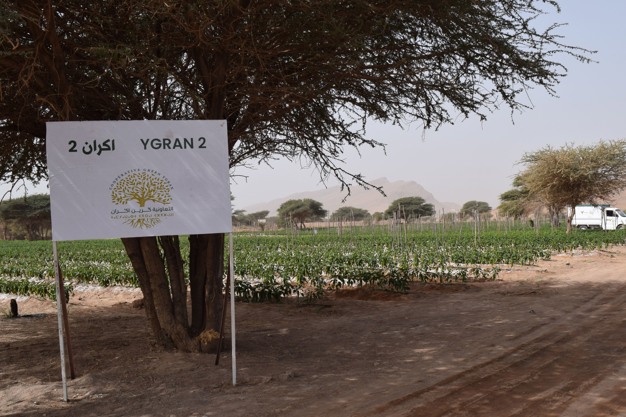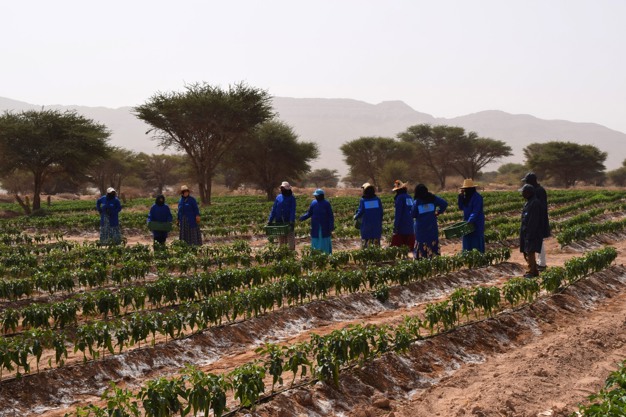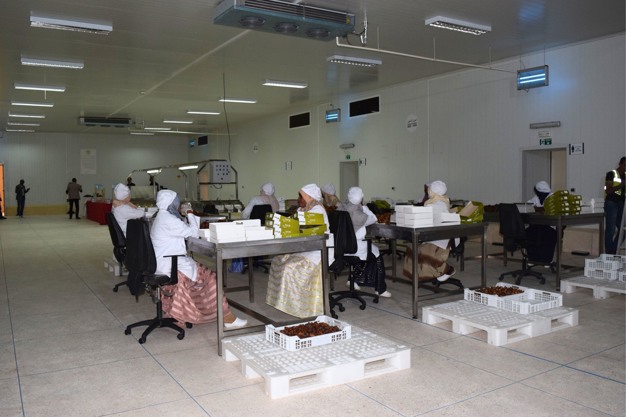At a time when climate change is testing Morocco, which is experiencing its sixth consecutive year of drought and drying up the water table in the country's biggest vegetable-growing regions, it has become crucial to explore new production areas. It is in this context that the Green Ygran cooperative was born in the southeastern province of Tata.

Tata is a mountainous region where commercial-scale agricultural production has long been limited to dates. However, "the region has great potential that is yet to be exploited," says Mbark Kaffa, grower and member of the Green Ygran cooperative. "Tata has fertile soil, a rich water table, and bright, clear sunlight, allowing more hours of photosynthesis. Fruit and vegetables have always been grown here, albeit on a subsistence scale, and the number of products that can be produced here is astonishing. The time has come for the region to become a center of commercial-scale production, and we're honored to be the first to take that path."
The Green Ygran cooperative launched its operations with a 20-hectare commercial trial of various early vegetables. As Mbark explains, "We developed our own pepper seeds in collaboration with the Turkish Manier Seeds. We produced 8 hectares of peppers this season, and the results are very satisfactory, with a yield of 60 tonnes per hectare in sizes 40 to 60, even though we started planting late. When we start on time next season, the yield will undoubtedly be better. We also have 10 hectares of beans, 2 hectares of tomatoes, and 1 hectare dedicated to trials of various other vegetables. The cooperative has additional acreage that we will plant according to demand. For example, we have concluded a contract for beans with a supermarket chain in Europe, which will go into production as early as next season."

Unlike the production model in the Agadir region, the Green Ygran cooperative produces in open fields. "This gives us a commercial advantage, as it considerably reduces our costs, bearing in mind that the specific climate of the Tata province allows open-field cultivation while ensuring high yields, and this goes hand in hand with the region's agroecological production methods."
Tata growers can also count on a major advantage: "The region is isolated, and commercial-scale production is new. We, therefore, have an absence of viruses that cause a stir in other regions, such as Tobrf in tomatoes or the viruses that infect cucumbers. The only problem we have is salinity, but it remains at a tolerable level and can be controlled only through irrigation."

Mbark preceded the launch of production with major commercial efforts, taking part in the biggest trade fairs such as Fruit Logistica and Fruit Attraction."On the commercial and market opening front, we have received a great deal of support from the Import Promotion Desk, an initiative of the German government, enabling us to take part in major exhibitions. We have also made progress on the certification process, and we expect to obtain GLOBALG.A, P, GRASP, BIO, SMETA this season and SMETA & BIO CREDIT CARBON next season. On the production front, we have also benefited from the support of the governor of the province of Tata, Salh Eddine Amal, who believed in our project, facilitated its realization, and closely monitored its progress, as well as the various departments of the Ministry of Agriculture".
"The convergence of the efforts of all these parties, the quality of the production, and the excellent farming operations have paid off," adds the grower."We already have contracts with customers in the UK, Germany, and the Netherlands, in addition to supplying the local market. This shows not only the technical feasibility of vegetable production in Tata but also its commercial viability."

Alongside the development of agricultural land, the Green Ygran Cooperative has launched a packing house and cold storage station in the town of Tata. Mbark explains, "The construction of the station is imbued with the same spirit of agroecology and sustainable development. It runs entirely on solar energy, which saves a significant part of costs. The station is 100% air-conditioned, increasing the shelf life of products without any break in the cold chain. We also use it for other products, such as dates."
Like other new agricultural production areas, the Tata region still lacks the infrastructure to match other major Moroccan agricultural regions. Mbark says, "It's true that more infrastructure is needed, but the situation is relatively good. The geographical location of Tata requires a 5-hour additional shipping time than Agadir, but thanks to the packaging station, this does not affect the shelf life of the produce. The transformation of the region is still in its early stages, and new public and private investment will come soon."

The inauguration of the Green Ygran's packing station, which was attended by the Minister for Agriculture, Mohammed Sadiki, and the governor of the region, was the occasion to look at the infrastructure needed in the short term. During the presentation of the project, the Minister of Agriculture stated that the region has great potential and that several crops can be produced there thanks to its climate and the availability of water, and announced plans by the Ministry in collaboration with the local authorities to strengthen irrigation facilities.
For more information:
Mbark Kaffa
Green Ygran Cooperative
Tel.: +212661236800
Email: m.kaffa@gmail.com
